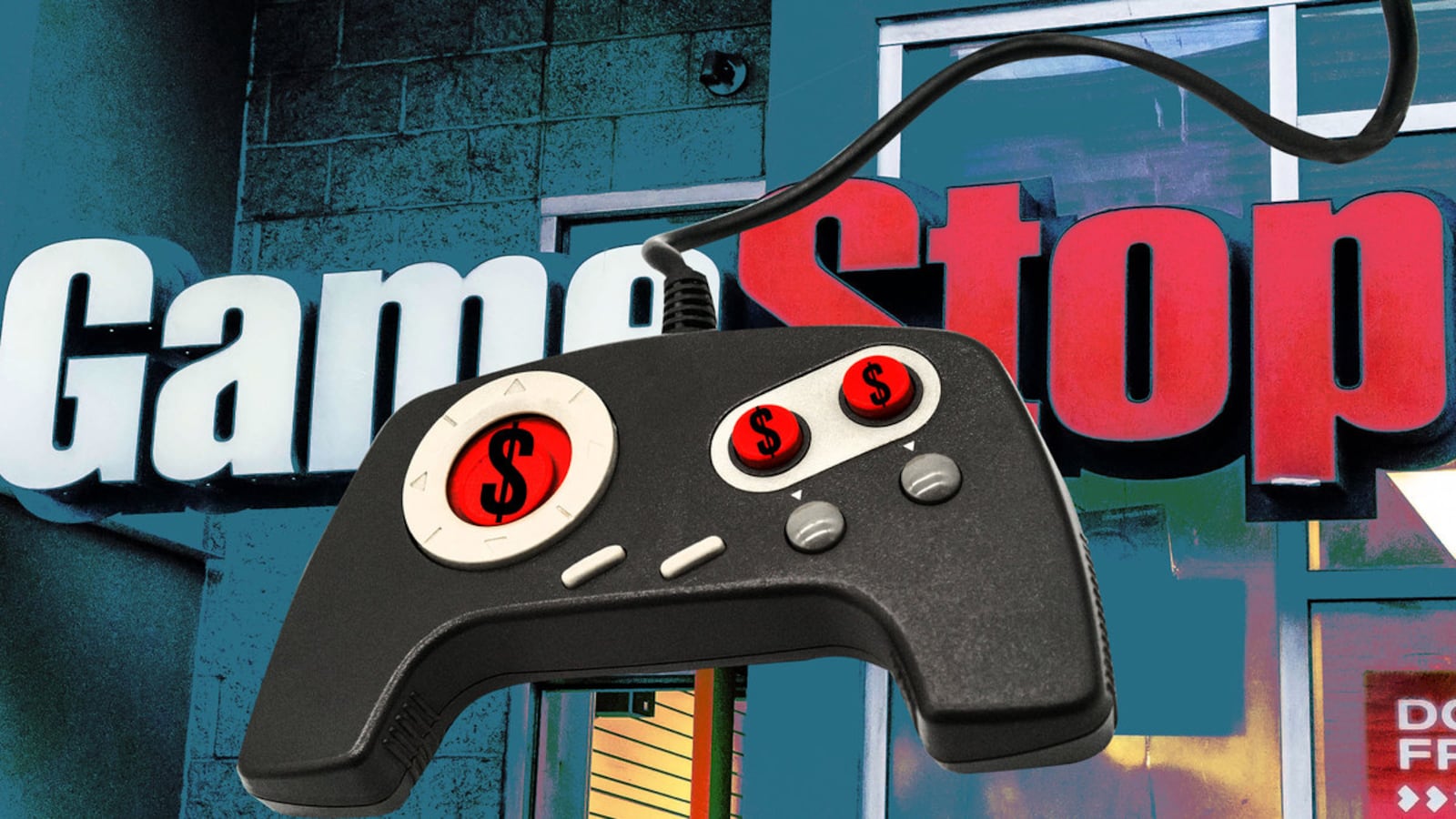Over the last weeks, something fantastic has been happening in the stock market: small-time investors are screwing with hedge funds using the market-manipulation techniques that those funds use all the time. And as GameStop and AMC shares ballooned in price for no reason other than the fact that a bunch of Reddit users with trading apps wanted them to, average Americans reading about this news have paused to think, by the millions: Wait a minute. The stock market is nonsense.
The story of GameStop stock’s incredible run is the best thing to happen to financial news since that one guy went to jail for the global financial implosion of 2008, because it has exposed the utter absurdity of the stock market—and at a time when the stock market has gone up and up and up, even as unemployment has shot up and most Americans’ financial well-being is completely decoupled from the market’s performance. A long-term bull market means nothing to a family one medical catastrophe away from bankruptcy. More than half of Americans have no stake whatsoever in the stock market—not in their personal holdings, not in mutual funds, not in investment choices made by pension managers. The performance of “the market” and well-being of “the American household” are less related than they’ve ever been.
The truth is that the stock market runs on the faith of pedantic bros who take it much too seriously. (I use the term “bros” anecdotally. I’m sure there are women out there who are just as obnoxiously devoted to upholding the illusion that “value” as it relates to share price is somehow based in reality, but the women are not the ones sending me multi-paragraph emails about how, actually, without hedge funds, my pension would go away. Bitch, I’m a millennial. What pension?)
The saga of Reddit investors’ crusade to gang up on hedge funds is, like the stock ticker, a volatile trendline of emotional ups and downs. It started when Reddit users using apps like Robinhood picked stocks to buy en masse (which drives the price of stocks up) based on lists of stocks that large hedge funds were shorting (aka betting that the price will go down), thus creating what’s known as a “squeeze,” which put those hedge funds in a place where they had to suddenly come up with enough cash to cover their “margin” (account requirement for entities trading derivatives of stocks they do not own, typically a percentage of the price of the underlying stock). Any hedge fund that can’t cover their margin on a stock short is in deep shit.
In response, hedge funds cried foul and trading apps like eTrade and RobinHood started severely restricting retail (that’s stock talk for “regular people”) investors; in RobinHood’s case, the app no longer allows customers to “open new positions” (basically, get in on the action) in GameStop and other stocks that Reddit hobbyists were going long on (buying) in order to fuck with the giant investors who were shorting (betting that the stock price would fall by selling borrowed shares). Robinhood, that is, turns out to be no Robin Hood.
To put it in layman’s terms, shorting stocks goes a little like this: say I borrowed a sweater from you that was valued at $100, and I agreed to return your sweater in a month. If I were “shorting” your sweater, I’d sell it to somebody else (even though I did not own the sweater) for its value ($100), anticipating that the value of the sweater would drop before I had to return it to you. If I could buy back your $100 sweater for only $50 on the day before I was supposed to return the sweater to you, my profit would be $50. However, if the sweater went up in value—let’s say it became a collector’s item because the designer died or something—I would have to buy the sweater back for a higher price than what I had sold it for. If I sold your $100 sweater, and by the time I had to give it back, it was worth $5,000, I would be out $4,900. Because of this possibility, you, the sweater lender, might require me to have a certain percentage of the value of the sweater on hand at all times, so that when the date arrives, I am able to afford to buy your sweater back, even if it goes up in price, even if it’s before the date that I must return the sweater. That’s called a “margin.”
That’s what happened with GameStop shares and the hedge funds that shorted its shares, except imagine that absurd $4,900 sweater was an absurd billions and billions of dollars in GameStop share value, and the hedge funds suddenly had to come up with enough cash to cover their margin. (Despite what a hedge fund manager that lost millions might say, this is both funny and good. A karmic bull market, if you will.) A Reddit investor could cash out at any point by selling their stock, and they’d earn money if the sell price was higher than the price at which they’d bought it.
If selling shares of stock that one doesn’t own sounds nuts, it’s because it is. Short selling was a major factor in the stock market crash of 1929. And yet!—if there’s anything we can’t learn when it comes to financial markets, it’s Our Lesson—short selling and predatory squeezing is a huge part of how hedge funds operate today.
That’s why so many regular people are calling foul over trading platforms’ attempts to “protect the market” by restricting the behavior of retail traders. Retail traders are only trying to do what hedge funds base their entire business models on. Why is it fair when entities worth billions do it but not when regular people do? Is “the market” actually the big institutional investors who are supposed to win? It’s like the Washington Generals are suddenly ahead of the Harlem Globetrotters in the fourth quarter.
All this brings up an uncomfortable truth: the fix is in. The stock market is not intellectually rigorous. It’s not scientific. It’s unmanageable chaos to outsiders; to insiders, it’s chaos that can be manipulated by the powerful for any reason or no reason at all. It’s expensive guessing on the part of regular people who buy in; it’s profitable manipulation on the part of institutions that control it. There are no experts, there are no wizards. Investing is not a serious intellectual pursuit; it’s a giant game of blackjack.
But those who rely on it need the rest of us to believe in it, like a Peter Pan audience clapping Tinkerbell back to life. Over on MarketWatch, a very serious man named Brett Arends chastised the “Reddit/GameStop army,” warning them that manipulating the market by driving up a share price was “gambling, not investing.” What’s the difference?
Years ago, I had my Series 7 and 66 licenses, two certifications that require anybody who wants to be a stockbroker to pass hours-long tests on stock trading and the laws that govern the financial services industry. I’ve long since let both expire and, quite honestly, I’ve forgotten most of what I knew about the intricacies of trading strategies and replaced that knowledge with more important information, like the title of the pornographic film that Ted Cruz’s Twitter account “liked” in 2017 (“Dick for Two”). But here’s the thing I remember about investing in the stock market: it’s absolutely a form of gambling. Owning stock exposes an investor to both up and downsides. There is no way to guarantee against loss. If a company goes belly-up, shareholders lose whatever principle they invested, even if, at one time, the stock made them millionaires on paper.
Even people whose job it is to pick stocks are extremely bad at portfolio management. Index funds—portfolios of stocks that are designed to mimic the movement of a particular index as a whole, selected and traded by a computer program—perform better than human-managed funds over long periods of time. Obscene amounts of human thought and labor are wasted trying to beat the market, and in most cases, the best way to “invest” in “the market” is to just let the market pick the stocks. Humans just mess it up.
When I worked in the financial world, I remember (sorry again guys— mostly male) coworkers waxing philosophical about how great investors invest without emotion, as though the thing keeping every Joe and Jane Investor with a copy of Stocks For Dummies from being stock market millionaires were their own feelings, and not the fact that the market itself is an inherently irrational, inherently unfair, and completely rigged game.
Most people don’t spend a lot of time thinking about financial instruments, because they’re convinced, for one reason or another, that it’s all very complicated and involves a lot of math and expertise and very serious people doing very serious work for very serious and important reasons. But what the GameStop story illustrates are some truths that especially unmoor stock market acolytes: The truth is that stock picking is no more advanced than a group of reality competition show fans joke-voting a shitty contestant into the finals. The truth is that even the great financial minds of the world have terrible track records when it comes to predicting what will happen, just as astrologers have a pretty bad track record for predicting global pandemics.
I grew up thinking that there was something inherently scientific, something intellectually rigorous, about working on Wall Street, probably because of the inaccessible alien jargon used by business journalists and the Hollywood trope of the ruthless stock wizard in pinstripes. But, when I actually started along the track to become a stockbroker myself, I realized that the entire business runs on not reality, but belief. The truth is that the market is a game, company value is an illusion, and most of the ways that we measure the macro economy are based on feelings and speculation.
And, while I don’t believe that people should be betting their life savings on a gambit designed to stick it to a hedge fund, if this is what it takes regulators to understand the urgency of financial market regulation, so be it. We’ve already lost enough at the roulette table.



